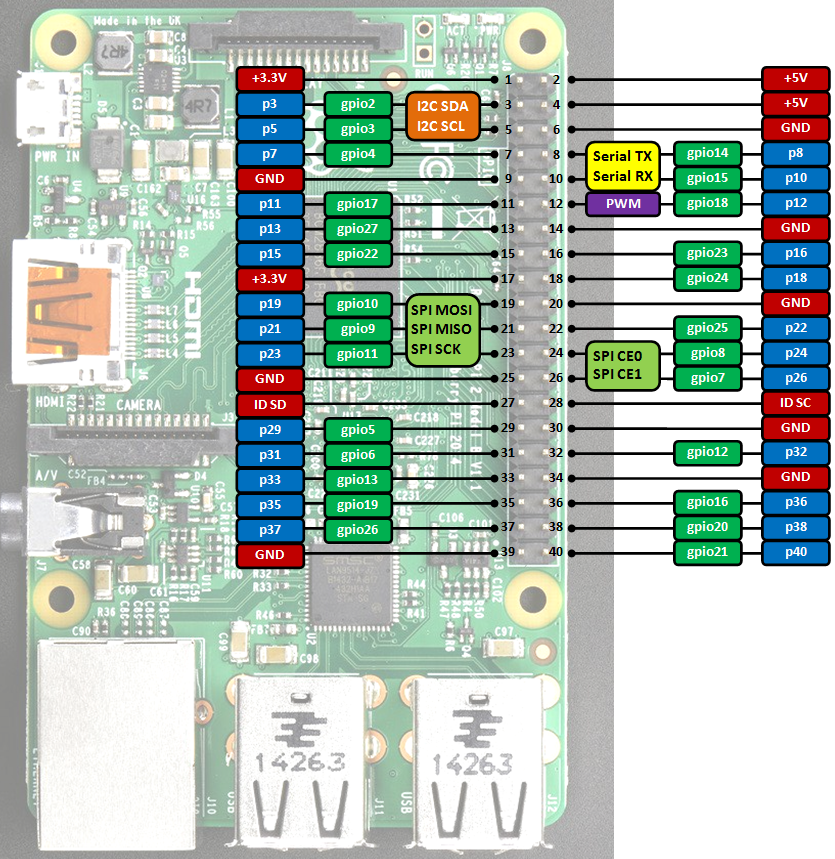mbed API for Raspberry Pi boards.
mbedPi
This is an attempt to implement a limited number of mbed APIs for Raspberry Pi single-board computers. The project was inspired by and based on the arduPi library developed for the Arduino by Cooking Hacks .
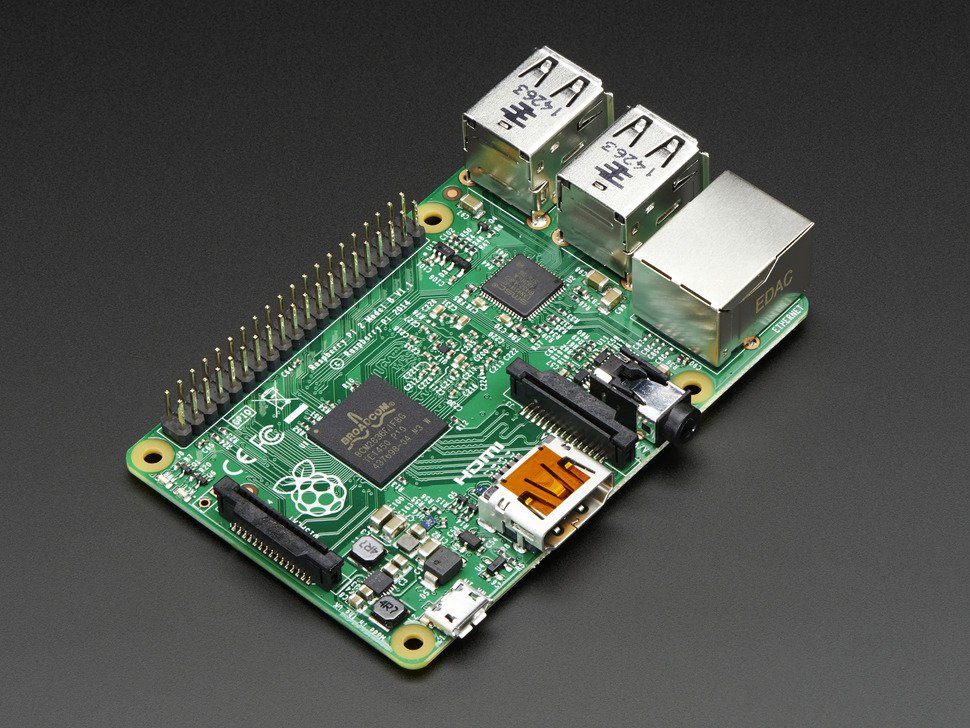
Specifications
- Chip: Broadcom BCM2836 SoC
- Core architecture: Quad-core ARM Cortex-A7
- CPU frequency: 900 MHz
- GPU: Dual Core VideoCore IV® Multimedia Co-Processor
- Memory: 1GB LPDDR2
- Operating System: Boots from Micro SD card, running a version of the Linux operating system
- Power: Micro USB socket 5V, 2A
Connectors
- Ethernet: 10/100 BaseT Ethernet socket
- Video Output: HDMI (rev 1.3 & 1.4)
- Audio Output: 3.5mm jack, HDMI
- USB: 4 x USB 2.0 Connector
- GPIO Connector: 40-pin 2.54 mm (100 mil) expansion header: 2x20 strip providing 27 GPIO pins as well as +3.3 V, +5 V and GND supply lines
- Camera Connector: 15-pin MIPI Camera Serial Interface (CSI-2)
- JTAG: Not populated
- Display Connector: Display Serial Interface (DSI) 15 way flat flex cable connector with two data lanes and a clock lane
- Memory Card Slot: Micro SDIO
GPIO connector pinout
Information
Only the labels printed in blue/white or green/white (i.e. p3, gpio2 ...) must be used in your code. The other labels are given as information (alternate-functions, power pins, ...).
Building programs for the Raspberry Pi with mbedPi
I use Qt Creator for development, however you can use any other IDE available on the Raspberry Pi (e.g. Geany) if you like. For a quick try:
- Install Qt and the Qt Creator onto your Raspberry Pi. Then create a new "Blinky" Plain non-Qt C++ Project as follows:
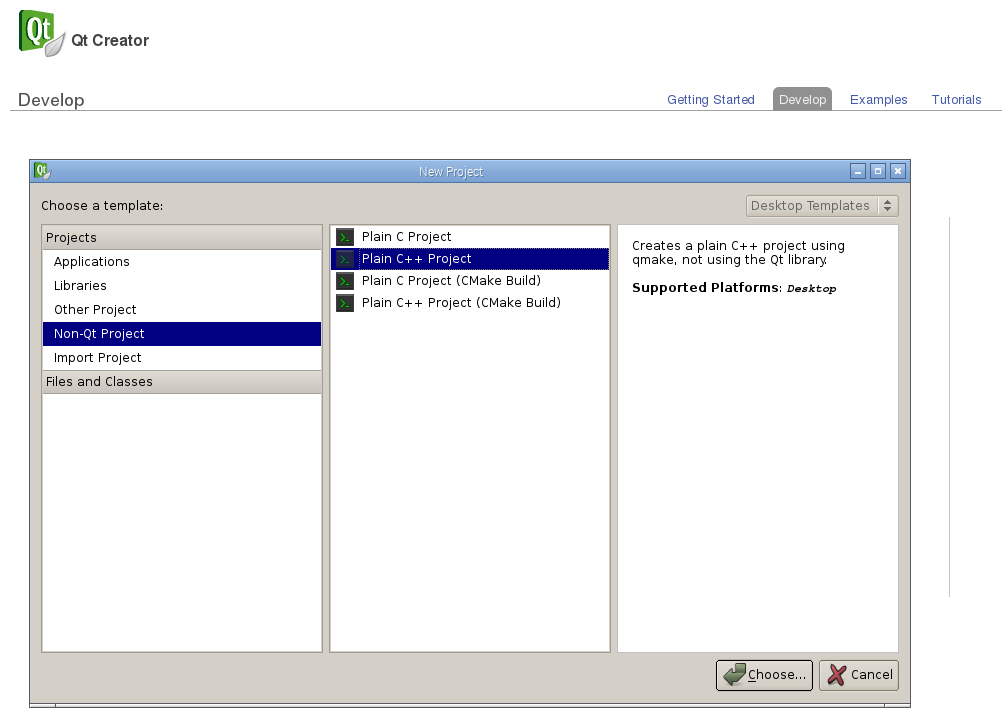
- Change the main code as below:
main.cpp
#include "mbedPi.h"
int main()
{
DigitalOut myled(p7);
while(1) {
myled = 1; // LED is ON
wait(0.2); // 200 ms
myled = 0; // LED is OFF
wait(1.0); // 1 sec
printf("Blink\r\n");
}
}
- Copy the mbedPi.zip file into your project's folder and unzip.
- Add the mbedPi.h and mbedPi.cpp files to your project by right clicking on the "Blinky" project and then clicking on the "Add Existing Files..." option in the local menu:
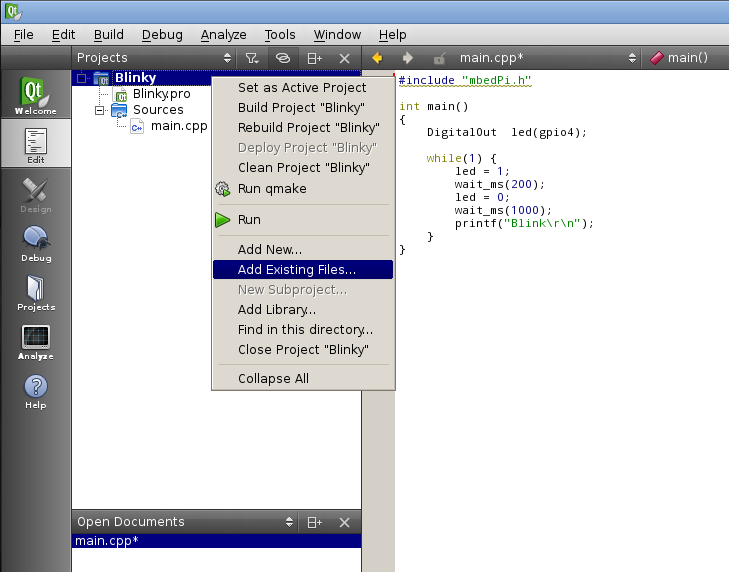
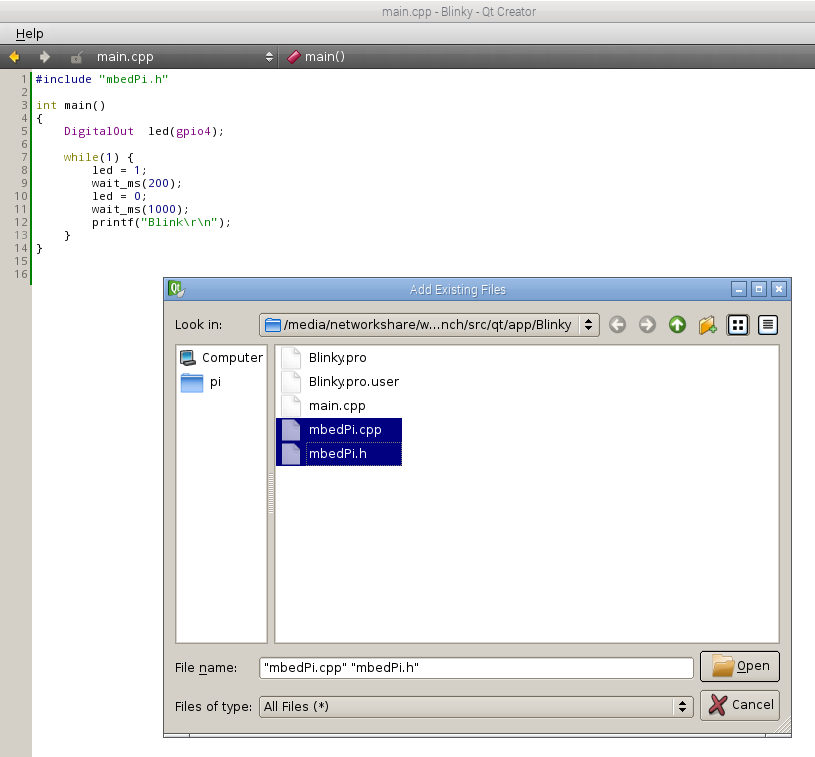
- Double click on Blinky.pro to open it for editing and add new libraries by inserting a new line as follows:
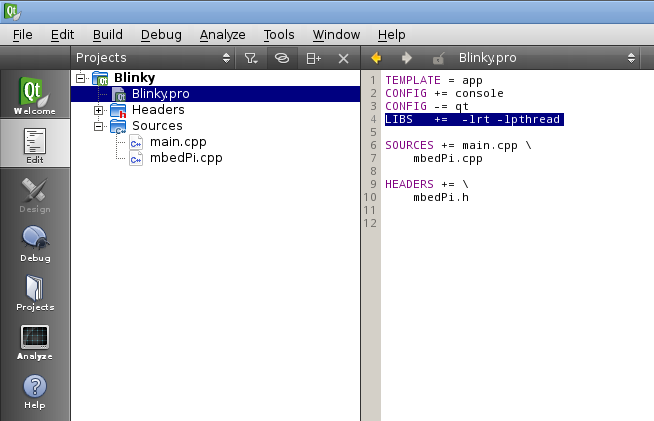
- Compile the project.
- Connect an LED through a 1k resistor to pin 7 and the ground on the Raspberry Pi GPIO connector.
- Run the binary as sudo (sudo ./Blinky) and you should see the LED blinking.

- Press Ctrl+c to stop running the application.
source/gpio.cpp@2:131555dc6fb7, 18 months ago (annotated)
- Committer:
- hudakz
- Date:
- Tue Dec 20 12:16:18 2022 +0000
- Revision:
- 2:131555dc6fb7
- Parent:
- 1:1f2d9982fa8c
Mbed API for Raspberry Pi boards equipped with BCM2836 SoC.
Who changed what in which revision?
| User | Revision | Line number | New contents of line |
|---|---|---|---|
| hudakz | 1:1f2d9982fa8c | 1 | #include "mbed.h" |
| hudakz | 1:1f2d9982fa8c | 2 | |
| hudakz | 1:1f2d9982fa8c | 3 | extern struct bcm2835_peripheral gpio; |
| hudakz | 1:1f2d9982fa8c | 4 | |
| hudakz | 1:1f2d9982fa8c | 5 | /********** FUNCTIONS OUTSIDE CLASSES **********/ |
| hudakz | 1:1f2d9982fa8c | 6 | |
| hudakz | 1:1f2d9982fa8c | 7 | // Write a HIGH or a LOW value to a digital pin |
| hudakz | 1:1f2d9982fa8c | 8 | void gpio_write(PinName pin, int value) |
| hudakz | 1:1f2d9982fa8c | 9 | { |
| hudakz | 1:1f2d9982fa8c | 10 | if (value == HIGH) |
| hudakz | 1:1f2d9982fa8c | 11 | GPSET0 = (1 << pin); |
| hudakz | 1:1f2d9982fa8c | 12 | else |
| hudakz | 1:1f2d9982fa8c | 13 | if (value == LOW) |
| hudakz | 1:1f2d9982fa8c | 14 | GPCLR0 = (1 << pin); |
| hudakz | 1:1f2d9982fa8c | 15 | |
| hudakz | 1:1f2d9982fa8c | 16 | wait_us(1); // Delay to allow any change in state to be reflected in the LEVn, register bit. |
| hudakz | 1:1f2d9982fa8c | 17 | } |
| hudakz | 1:1f2d9982fa8c | 18 | |
| hudakz | 1:1f2d9982fa8c | 19 | // Reads the value from a specified digital pin, either HIGH or LOW. |
| hudakz | 1:1f2d9982fa8c | 20 | int gpio_read(PinName pin) |
| hudakz | 1:1f2d9982fa8c | 21 | { |
| hudakz | 1:1f2d9982fa8c | 22 | Digivalue value; |
| hudakz | 1:1f2d9982fa8c | 23 | if (GPLEV0 & (1 << pin)) |
| hudakz | 1:1f2d9982fa8c | 24 | value = HIGH; |
| hudakz | 1:1f2d9982fa8c | 25 | else |
| hudakz | 1:1f2d9982fa8c | 26 | value = LOW; |
| hudakz | 1:1f2d9982fa8c | 27 | |
| hudakz | 1:1f2d9982fa8c | 28 | return value; |
| hudakz | 1:1f2d9982fa8c | 29 | } |
| hudakz | 1:1f2d9982fa8c | 30 | |
| hudakz | 1:1f2d9982fa8c | 31 | // Function select |
| hudakz | 1:1f2d9982fa8c | 32 | // pin is a BCM2835 GPIO pin number NOT RPi pin number |
| hudakz | 1:1f2d9982fa8c | 33 | // There are 6 control registers, each control the functions of a block |
| hudakz | 1:1f2d9982fa8c | 34 | // of 10 pins. |
| hudakz | 1:1f2d9982fa8c | 35 | // Each control register has 10 sets of 3 bits per GPIO pin: |
| hudakz | 1:1f2d9982fa8c | 36 | // |
| hudakz | 1:1f2d9982fa8c | 37 | // 000 = GPIO Pin X is an input |
| hudakz | 1:1f2d9982fa8c | 38 | // 001 = GPIO Pin X is an output |
| hudakz | 1:1f2d9982fa8c | 39 | // 100 = GPIO Pin X takes alternate function 0 |
| hudakz | 1:1f2d9982fa8c | 40 | // 101 = GPIO Pin X takes alternate function 1 |
| hudakz | 1:1f2d9982fa8c | 41 | // 110 = GPIO Pin X takes alternate function 2 |
| hudakz | 1:1f2d9982fa8c | 42 | // 111 = GPIO Pin X takes alternate function 3 |
| hudakz | 1:1f2d9982fa8c | 43 | // 011 = GPIO Pin X takes alternate function 4 |
| hudakz | 1:1f2d9982fa8c | 44 | // 010 = GPIO Pin X takes alternate function 5 |
| hudakz | 1:1f2d9982fa8c | 45 | // |
| hudakz | 1:1f2d9982fa8c | 46 | // So the 3 bits for port X are: |
| hudakz | 1:1f2d9982fa8c | 47 | |
| hudakz | 1:1f2d9982fa8c | 48 | // X / 10 + ((X % 10) * 3) |
| hudakz | 1:1f2d9982fa8c | 49 | |
| hudakz | 1:1f2d9982fa8c | 50 | void bcm2835_gpio_fsel(uint8_t pin, uint8_t mode) |
| hudakz | 1:1f2d9982fa8c | 51 | { |
| hudakz | 1:1f2d9982fa8c | 52 | // Function selects are 10 pins per 32 bit word, 3 bits per pin |
| hudakz | 1:1f2d9982fa8c | 53 | volatile uint32_t* paddr = (volatile uint32_t*)gpio.map + BCM2835_GPFSEL0 / 4 + (pin / 10); |
| hudakz | 1:1f2d9982fa8c | 54 | uint8_t shift = (pin % 10) * 3; |
| hudakz | 1:1f2d9982fa8c | 55 | uint32_t mask = BCM2835_GPIO_FSEL_MASK << shift; |
| hudakz | 1:1f2d9982fa8c | 56 | uint32_t value = mode << shift; |
| hudakz | 1:1f2d9982fa8c | 57 | |
| hudakz | 1:1f2d9982fa8c | 58 | bcm2835_peri_set_bits(paddr, value, mask); |
| hudakz | 1:1f2d9982fa8c | 59 | } |
| hudakz | 1:1f2d9982fa8c | 60 | |
| hudakz | 1:1f2d9982fa8c | 61 | /** |
| hudakz | 1:1f2d9982fa8c | 62 | * @brief |
| hudakz | 1:1f2d9982fa8c | 63 | * @note |
| hudakz | 1:1f2d9982fa8c | 64 | * @param |
| hudakz | 1:1f2d9982fa8c | 65 | * @retval |
| hudakz | 1:1f2d9982fa8c | 66 | */ |
| hudakz | 1:1f2d9982fa8c | 67 | void gpio_dir(PinName pin, PinDirection direction) |
| hudakz | 1:1f2d9982fa8c | 68 | { |
| hudakz | 1:1f2d9982fa8c | 69 | uint8_t gpfsel = pin / 10; |
| hudakz | 1:1f2d9982fa8c | 70 | uint8_t shift = (pin % 10) * 3; |
| hudakz | 1:1f2d9982fa8c | 71 | uint32_t mask = BCM2835_GPIO_FSEL_MASK << shift; |
| hudakz | 1:1f2d9982fa8c | 72 | uint32_t outp = BCM2835_GPIO_FSEL_OUTP << shift; |
| hudakz | 1:1f2d9982fa8c | 73 | |
| hudakz | 1:1f2d9982fa8c | 74 | if (direction == PIN_OUTPUT) { |
| hudakz | 1:1f2d9982fa8c | 75 | *(gpio.addr + gpfsel) &= ~mask; |
| hudakz | 1:1f2d9982fa8c | 76 | *(gpio.addr + gpfsel) |= outp; |
| hudakz | 1:1f2d9982fa8c | 77 | } |
| hudakz | 1:1f2d9982fa8c | 78 | else |
| hudakz | 1:1f2d9982fa8c | 79 | if (direction == PIN_INPUT) { |
| hudakz | 1:1f2d9982fa8c | 80 | *(gpio.addr + gpfsel) &= ~mask; |
| hudakz | 1:1f2d9982fa8c | 81 | } |
| hudakz | 1:1f2d9982fa8c | 82 | } |
| hudakz | 1:1f2d9982fa8c | 83 | |
| hudakz | 1:1f2d9982fa8c | 84 | /** |
| hudakz | 1:1f2d9982fa8c | 85 | * @brief |
| hudakz | 1:1f2d9982fa8c | 86 | * @note |
| hudakz | 1:1f2d9982fa8c | 87 | * @param |
| hudakz | 1:1f2d9982fa8c | 88 | * @retval |
| hudakz | 1:1f2d9982fa8c | 89 | */ |
| hudakz | 1:1f2d9982fa8c | 90 | void gpio_mode(PinName pin, PinMode mode) |
| hudakz | 1:1f2d9982fa8c | 91 | { |
| hudakz | 1:1f2d9982fa8c | 92 | mode == PullUp ? gpio_write(pin, HIGH) : gpio_write(pin, LOW); |
| hudakz | 1:1f2d9982fa8c | 93 | } |
| hudakz | 1:1f2d9982fa8c | 94 | |
| hudakz | 1:1f2d9982fa8c | 95 | /** |
| hudakz | 1:1f2d9982fa8c | 96 | * @brief |
| hudakz | 1:1f2d9982fa8c | 97 | * @note |
| hudakz | 1:1f2d9982fa8c | 98 | * @param |
| hudakz | 1:1f2d9982fa8c | 99 | * @retval |
| hudakz | 1:1f2d9982fa8c | 100 | */ |
| hudakz | 1:1f2d9982fa8c | 101 | uint8_t shiftIn(PinName dPin, PinName cPin, bcm2835SPIBitOrder order) |
| hudakz | 1:1f2d9982fa8c | 102 | { |
| hudakz | 1:1f2d9982fa8c | 103 | uint8_t value = 0; |
| hudakz | 1:1f2d9982fa8c | 104 | int8_t i; |
| hudakz | 1:1f2d9982fa8c | 105 | |
| hudakz | 1:1f2d9982fa8c | 106 | if (order == MSBFIRST) |
| hudakz | 1:1f2d9982fa8c | 107 | for (i = 7; i >= 0; --i) { |
| hudakz | 1:1f2d9982fa8c | 108 | gpio_write(cPin, HIGH); |
| hudakz | 1:1f2d9982fa8c | 109 | value |= gpio_read(dPin) << i; |
| hudakz | 1:1f2d9982fa8c | 110 | gpio_write(cPin, LOW); |
| hudakz | 1:1f2d9982fa8c | 111 | } |
| hudakz | 1:1f2d9982fa8c | 112 | else |
| hudakz | 1:1f2d9982fa8c | 113 | for (i = 0; i < 8; ++i) { |
| hudakz | 1:1f2d9982fa8c | 114 | gpio_write(cPin, HIGH); |
| hudakz | 1:1f2d9982fa8c | 115 | value |= gpio_read(dPin) << i; |
| hudakz | 1:1f2d9982fa8c | 116 | gpio_write(cPin, LOW); |
| hudakz | 1:1f2d9982fa8c | 117 | } |
| hudakz | 1:1f2d9982fa8c | 118 | |
| hudakz | 1:1f2d9982fa8c | 119 | return value; |
| hudakz | 1:1f2d9982fa8c | 120 | } |
| hudakz | 1:1f2d9982fa8c | 121 | |
| hudakz | 1:1f2d9982fa8c | 122 | /** |
| hudakz | 1:1f2d9982fa8c | 123 | * @brief |
| hudakz | 1:1f2d9982fa8c | 124 | * @note |
| hudakz | 1:1f2d9982fa8c | 125 | * @param |
| hudakz | 1:1f2d9982fa8c | 126 | * @retval |
| hudakz | 1:1f2d9982fa8c | 127 | */ |
| hudakz | 1:1f2d9982fa8c | 128 | void shiftOut(PinName dPin, PinName cPin, bcm2835SPIBitOrder order, uint8_t val) |
| hudakz | 1:1f2d9982fa8c | 129 | { |
| hudakz | 1:1f2d9982fa8c | 130 | int8_t i; |
| hudakz | 1:1f2d9982fa8c | 131 | |
| hudakz | 1:1f2d9982fa8c | 132 | if (order == MSBFIRST) |
| hudakz | 1:1f2d9982fa8c | 133 | for (i = 7; i >= 0; --i) { |
| hudakz | 1:1f2d9982fa8c | 134 | gpio_write(dPin, val & (1 << i)); |
| hudakz | 1:1f2d9982fa8c | 135 | gpio_write(cPin, HIGH); |
| hudakz | 1:1f2d9982fa8c | 136 | gpio_write(cPin, LOW); |
| hudakz | 1:1f2d9982fa8c | 137 | } |
| hudakz | 1:1f2d9982fa8c | 138 | else |
| hudakz | 1:1f2d9982fa8c | 139 | for (i = 0; i < 8; ++i) { |
| hudakz | 1:1f2d9982fa8c | 140 | gpio_write(dPin, val & (1 << i)); |
| hudakz | 1:1f2d9982fa8c | 141 | gpio_write(cPin, HIGH); |
| hudakz | 1:1f2d9982fa8c | 142 | gpio_write(cPin, LOW); |
| hudakz | 1:1f2d9982fa8c | 143 | } |
| hudakz | 1:1f2d9982fa8c | 144 | } |
| hudakz | 1:1f2d9982fa8c | 145 |
